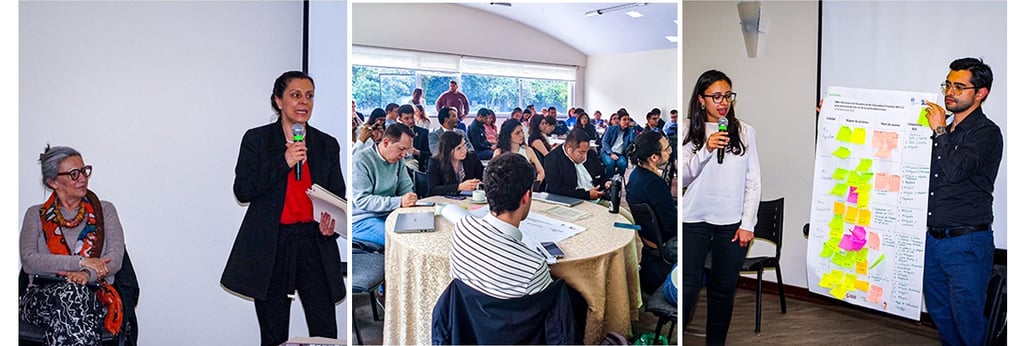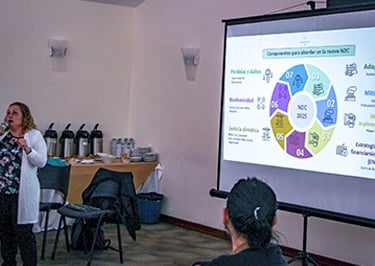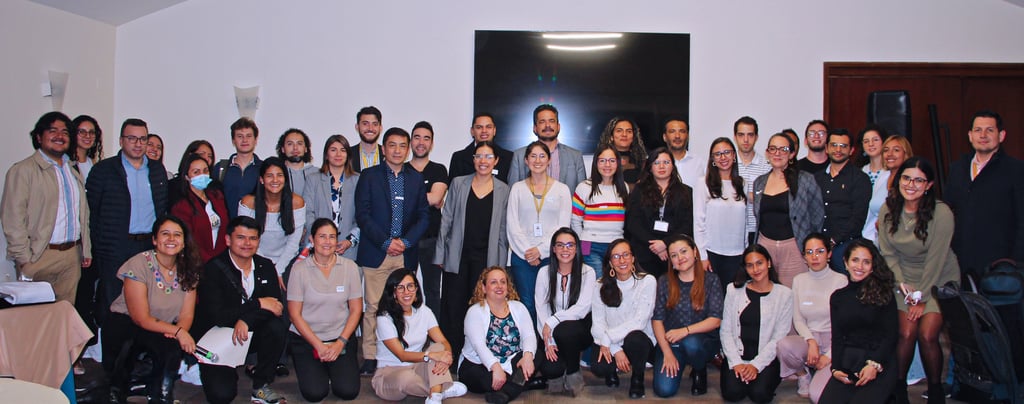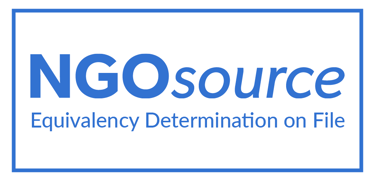No Planet B: The NDCs Update and Colombia’s Challenge


Under the Paris Agreement framework, Colombia is moving forward with updating its Nationally Determined Contributions (NDCs), identifying key actions to transition beyond fossil fuels in energy systems in a fair, orderly, and equitable manner.
At POLEN Just Transitions, in collaboration with civil society organizations and in coordination with the Ministry of Environment and Sustainable Development, we have pushed for this update to not only meet the calls for action in the Global Stocktake but also to integrate principles of climate justice and territorial participation. Our role has been to coordinate multi-sectoral efforts to ensure that the energy transition is inclusive and territorially fair.
This update must not be limited to a mere statement of intent but should become an effective roadmap that drives real and sustainable transformations. Climate justice, community participation, and territorial equity must be the fundamental pillars to ensure that the implementation of the NDCs does not reproduce inequalities but contributes to building a more sustainable and inclusive country.
Why is updating Colombia’s NDCs crucial?
Updating the NDCs is an opportunity to strengthen and guide national policies to respond more effectively to the urgency of the global climate crisis. This process goes beyond setting emission reduction targets; it must also ensure that multi-sectoral climate action and transition strategies are well-articulated, inclusive, and socially just. To achieve this, several key aspects must be considered:
Multi-sectoral and territorial participation: Climate action cannot rely solely on the national government; it requires the integration of diverse actors, including local communities, the private sector, academia, and civil society. A collaborative approach allows the NDCs to reflect the realities, needs, and capacities of each sector and region.
Just Energy Transition: Decarbonizing the economy must go hand in hand with protecting labor rights and diversifying economic opportunities for workers and communities dependent on extractive industries. A planned and equitable transition is essential to minimize negative impacts and foster decentralized and sustainableenergy models.
Climate justice and social inclusion: The climate crisis disproportionately affects vulnerable communities. The NDC update must incorporate a human rights approach, gender equity, and recognition of Indigenous and Afro-descendant peoples, ensuring that climate solutions do not reinforce inequalities but promote collective well-being.
Financing and sustainability: Without adequate financing mechanisms, NDC targets risk remaining empty commitments. It is essential to ensure public and private investment sources for sustainable project implementation and design incentives that facilitate the adoption of clean technologies and climate-resilient production models.
Updating the NDCs should not be seen merely as an international obligation but as a key tool for Colombia’s structural transformation toward a fairer and more sustainable development model. Ensuring effective implementation will depend on political commitment, citizen participation, and the ability to coordinate concrete actions with a real impact on the ground.


Progress and Challenges in Updating the NDCs
Significant Progress
Updating Colombia’s NDCs is an opportunity to strengthen a more ambitious and participatory climate agenda, with key advancements across multiple areas. These progress points reflect Colombia’s commitment to climate action and its alignment with global sustainability goals. Some of the most notable achievements include:
International Commitments: Colombia has strengthened its global climate position by joining initiatives such as the Powering Past Coal Alliance (PPCA), the Fossil Fuel Non-Proliferation Treaty, the Beyond Oil and Gas Alliance (BOGA), and the Alliance for the Elimination of Fossil Fuel Subsidies. These commitments mark a significant step in the transition toward a post-fossil future.
National Decarbonization Policies: Strategies aimed at reducing fossil fuel demand have been promoted, including transport electrification, industrial policies, and sustainable production models. On the demand side, public policies for renewable energy deployment have been crucial, especially those under the energy democratization framework, which aim to give more agency to communities and regions in energy systems.
Strengthening Social Participation: The inclusion of community actors, academia, and the private sector in discussions surrounding NDC 3.0 has been a fundamental step in ensuring that climate strategies reflect the country’s realities. Expanding these dialogue spaces has allowed for diverse perspectives to be heard and for greater ownership of climate goals across different sectors of society.


Persistent Challenges
Despite these advances, implementing Colombia’s NDCs faces structural barriers that hinder their effective execution. The main challenges include:
Implementation gaps: Many of the current NDC measures lack clear execution and financing plans. Without robust investment and monitoring mechanisms, there is a risk that NDC commitments will remain paper promises with no real impact on emissions reduction.
Dependence on extractive industries: The economic reliance on fossil fuels in some regions creates uncertainty regarding the energy transition. The lack of viable economic alternatives and productive diversification strategies makes it difficult for communities and workers to transition to new development models without socioeconomic harm. That is why territorial actions must go beyond measuring avoided emissions and actively involve communities in developing low-carbon economic activities.
Intersectoral coordination: Implementing the NDCs requires stronger coordination between the government, the private sector, and civil society. Building a clear climate governance structure and citizen oversight mechanisms is essential to prevent actions from being fragmented and having reduced impact at the territorial level.
Territorial inequality and access to implementation resources: Many vulnerable communities still lack the infrastructure and resources to drive territorial actions that allow them to be active participants in the just transition and adapt to climate change. If climate actions do not acknowledge existing inequalities, solutions will continue to overlook certain territories and widen socio-economic gaps.
For the NDC update to go beyond formal commitments, it is essential to translate these objectives into concrete, well-coordinated actions with strong financing mechanisms. The success of Colombia’s energy transition and climate action will depend on the country’s ability to ensure that these measures are implemented with a territorial focus, ensuring tangible impacts on vulnerable communities and sectors.
At POLEN Just Transitions, we reaffirm the urgency of ensuring that Colombia’s NDCs are deeply rooted in social and environmental justice principles. The energy transition must not be limited to changing the energy generation matrix but should become an opportunity to close inequality gaps, strengthen local capacities, and ensure that communities play a central role in implementing climate actions.
We advocate for a sustainable development model where equity, citizen participation, and respect for human rightsare the core principles of climate action. Achieving this requires firm commitments from the government, the private sector, and civil society, as well as strong political will to prioritize structural and long-term solutions.
For more information on Colombia’s NDC update, it is recommended to consult the official documents of the Ministry of Environment and Sustainable Development.





